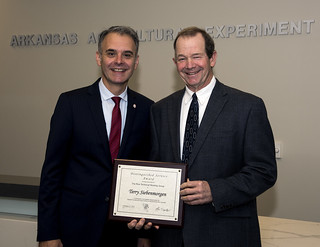Siebenmorgen receives Distinguished Service Award for contributions to rice industry
March 22, 2018
Siebenmorgen receives Distinguished Service Award for contributions to rice industry
Fast Facts:
- Rice Technical Working Group recognizes Dr. Terry Siebenmorgen’s career service
- Siebenmorgen built and leads the Division of Agriculture’s Rice Processing Program
- Program aims to improve post-harvest processing for rice
PHOTO available for download: https://flic.kr/p/24ieBs1
Related PHOTOS: https://flic.kr/s/aHskuXKkvK
(729 words)
FAYETTEVILLE, Ark. — Terry Siebenmorgen, director of the University of Arkansas System Division of Agriculture’s Rice Processing Program, received the Rice Technical Working Group Distinguished Service Award at the organization’s biennial meeting last month in Long Beach, Calif.
The award recognizes Siebenmorgen’s career-long research to improve post-harvest rice processing.

“Dr. Siebenmorgen has dedicated his career to serving the rice industry and his research has had tremendous impact and real world applications,” said Jean-François Meullenet, interim director of the Division of Agriculture’s Arkansas Agricultural Experiment Station. “I am thrilled for Terry to be receiving this award from the Rice Technical Working Group. Well deserved”
Siebenmorgen’s research and outreach program has focused on rice process engineering. The scope of his work ranges from preharvest property characterization, through drying, storage, milling, and end-use quality evaluation.
Often describing himself as an agricultural engineer, Siebenmorgen has crossed the lines of scientific disciplines to paint a complete picture of what goes on during rice processing.
Using an integrated approach that involves polymer chemistry, cereal chemistry, and crop physiology, Siebenmorgen’s research has improved understanding of the development, composition and processing behavior of individual rice kernels.
He developed and tested the “glass transition hypothesis” concerning how rice kernels change in physical and chemical structure because of heating during drying. Subsequent research showed that under certain conditions, this process can lead to some kernels fissuring and then breaking during milling. More precision in harvesting rice at ideal moisture content and adjusting drying methods led to greater milling yields and improved food quality and value.
Among other revelations, Siebenmorgen’s research showed that pre-harvest conditions, such as high highttime air temperatures had an impact on post-harvest quality and milling yields. Understanding the physical and chemical activity in rice kernels during harvest and processing led to industry adoption of solutions that have improved food quality in the rice industry.
Siebenmorgen also developed new research procedures that changed how scientists think about rice. Among these, he pioneered kernel-to-kernel technology that rapidly measures individual kernel properties. He also implemented automated imaging technology and other systems that more quickly and accurately measure and assess rice kernel characteristics.
“Dr. Siebenmorgen is recognized in the U.S. rice industry as the leader in post-harvest rice research,” said Keith Glover, president and CEO of Producers Rice Mill, Inc., of Stuttgart, Ark.
Dean Oliver, director of Innovation & Technical Services, and Michael Smith, vice president for Quality & Innovation, both of Riceland Foods, co-signed a letter supporting Siebenmorgen’s nominations for the award.
“Dr. Siebenmorgen has invested his career in providing practical research to develop real solutions to some of the rice processing industry’s greatest opportunities,” they said in the letter. “A mentor to dozens of students who have come through his program and a true friend to many colleagues around the world.”
During his career at the University of Arkansas, Siebenmorgen built his research into a broader program, combining the expertise of collaborating food science researchers, laboratory staff and graduate students into the Rice Processing Program, based at the Division of Agriculture’s Arkansas Agricultural Research and Extension Center in Fayetteville.
To make sure the program’s research was meeting the needs of the rice industry and consumers, Siebenmorgen recruited food companies from across the U.S. to form the Rice Industry Alliance, which now holds annual meetings to share research and solicit feedback from the industry.
“Forming the Rice Industry Alliance was a stroke of genius,” said Nathan McKinney, Arkansas Agricultural Experiment Station assistant director and interim director of the Rice Research and Extension Center in Stuttgart.
“Holding the Alliance together and keeping it relevant over 25 years is evidence of remarkable leadership,” McKinney said.
Siebenmorgen is quick to share credit for his success.
“With any recognition there are so many people to thank,” Siebenmorgen said.
“There are countless faculty, administrator and staff colleagues and graduate students who contribute to our work,” he said. “I couldn’t do this without them. And we have tremendous industry support, without which we couldn’t have come this far.”
“I’m grateful to everyone who has worked with me and supported me for this career-level award,” Siebenmorgen said.
The Rice Technical Working Group brings together rice researchers from seven major rice producing states — Arkansas, Califoria, Florida, Louisiana, Mississippi, Missouri and Texas — to encourage a continuous exchange of information, cooperative planning and periodic review of rice research and extension programs. The RTWG also develops research proposals for participating institutions.
About the Division of Agriculture
The University of Arkansas System Division of Agriculture’s mission is to strengthen agriculture, communities, and families by connecting trusted research to the adoption of best practices. Through the Agricultural Experiment Station and the Cooperative Extension Service, the Division of Agriculture conducts research and extension work within the nation’s historic land grant education system.
The Division of Agriculture is one of 20 entities within the University of Arkansas System. It has offices in all 75 counties in Arkansas and faculty on five system campuses.
Pursuant to 7 CFR § 15.3, the University of Arkansas System Division of Agriculture offers all its Extension and Research programs and services (including employment) without regard to race, color, sex, national origin, religion, age, disability, marital or veteran status, genetic information, sexual preference, pregnancy or any other legally protected status, and is an equal opportunity institution.
By Fred Miller
Arkansas Agricultural Experiment Station
U of A System Division of Agriculture
Media Contact: Fred Miller
Communication Services
U of A Division of Agriculture
(479) 575-5647
fmiller@uada.edu
Related Links